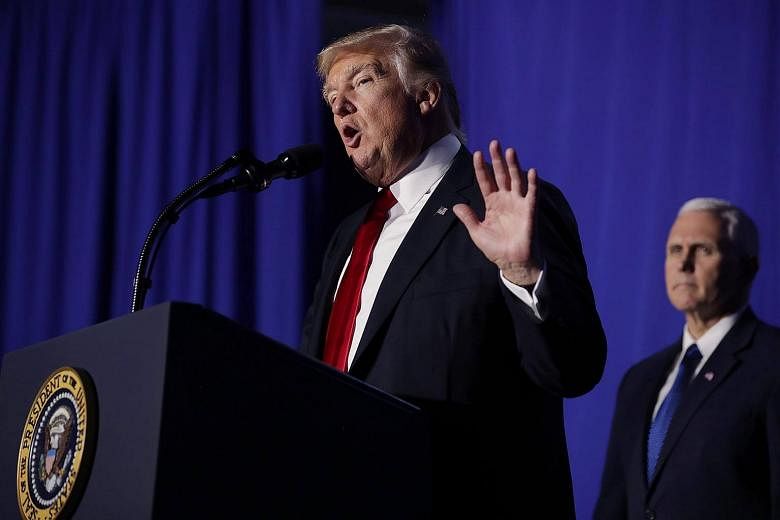WASHINGTON (REUTERS) - President Donald Trump said on Wednesday (Jan 25) he would seek an investigation into what he believed was voter fraud in last November's election, despite an overwhelming consensus among state officials, election experts, and politicians that it is rare in the United States.
The announcement drew rebukes from both Republicans and Democrats who said the Republican president's unsubstantiated claims of large-scale fraud could undermine voting rights efforts as well as confidence in the new US chief executive.
In the Nov 8 election, Mr Trump lost the popular vote to Democrat Hillary Clinton by nearly three million ballots. Irked by that large figure, he has blamed voter fraud without citing evidence.
"I will be asking for a major investigation into VOTER FRAUD, including those registered to vote in two states, those who are illegal and....even, those registered to vote who are dead (and many for a long time)," Mr Trump said on Twitter. "Depending on results, we will strengthen up voting procedures!"
In an interview with ABC News, Mr Trump said none of the illegal votes would have been cast for him. "They would all be for the other side," he said.
White House press secretary Sean Spicer later told a news briefing that the probe would not focus on only the 2016 election.
Three Democratic congressmen demanded proof of such fraud and sent a letter to election officials and attorneys general in all 50 US states seeking examples of cases of fraud in November's vote.
Many of the state officials did not need prompting with election officers in several states rejecting Mr Trump's claims immediately.
"Easy to vote, hard to cheat #Ohio," Ohio's Republican Secretary of State Jon Husted said in a Twitter post rebutting Mr Trump's claim that three million to five million illegal immigrants voted against him.
"That's impossible," Democratic Secretary of State Alex Padilla of California said on CNN.
There is no history of widespread voter fraud in US elections. Leading Republicans, including the top Republican in Congress, House of Representatives Speaker Paul Ryan, have rejected the claims.
Mr Ryan, however, said in an interview on Wednesday with MSNBC that if Mr Trump believes there was widespread fraud, "the right thing is to get an investigation to get the facts."
Mr Trump won the state-by-state Electoral College tally that decides the presidency, but the historic popular vote gap and allegations of Russian meddling in the election on his behalf have led some to say his victory was not legitimate.
NO EVIDENCE .
Mr Trump's announcement that he will seek an investigation appeared to be prompted by a White House news briefing on Tuesday in which press secretary Sean Spicer confirmed that the president continued to believe millions of illegal immigrants voted in the election.
Mr Spicer initially said there was no investigation planned but changed tack after persistent questioning, saying "maybe we will ... anything is possible."
Federal investigations of voter fraud are rare. A five-year probe initiated by Republican President George W. Bush's administration turned up no evidence of voter fraud and ended in resignations and more investigations for the Department of Justice which enforces federal voting rights laws.
"Republicans have used claims of widespread voter fraud to discriminate and restrict access to the ballot box for years,"said Democratic US Representative James Clyburn of South Carolina.
Mr Trump's attorney general nominee, Republican Senator Jeff Sessions, has been criticised for his record on voting rights and race relations. A voter fraud case he prosecuted as a US attorney in his home state of Alabama helped derail his confirmation as a federal judge in 1986.
Voting rights experts at New York University's Brennan Centre for Justice urged Mr Sessions to heed lessons of the past.
"In 2007, the Justice Department was upended by scandal because it had pursued a partisan agenda on voting, under the guise of rooting out suspected 'voter fraud,'" Mr Adam Gitlin and Ms Wendy Weiser wrote in a Jan 7 report for the centre.
"DOJ political leadership fired seven well-respected US attorneys, dismissing some top Republican prosecutors because they had refused to prosecute non-existent voter fraud," they wrote.
The firings scandal prompted the resignation of the attorney general, Alberto Gonzales, they said.
Others expressed concern that Mr Trump's repetition of falsehoods, including the size of inauguration crowds as well as voter fraud, could undermine public confidence.
US Representative Adam Schiff, the top Democrat on the House intelligence committee, said Mr Trump will need to be believed when he makes the case about a foreign threat and cannot reveal the intelligence behind it.
"Our new president is doing deep damage to himself and to our country," Mr Schiff said on Wednesday at the Centre for American Progress think tank.

